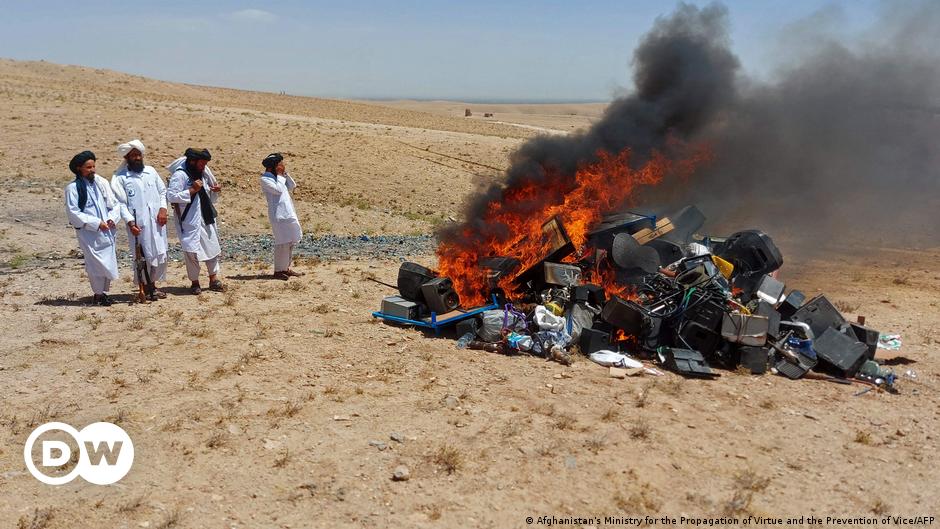Taliban’s religious police reportedly burned a number of musical instruments in the western province of Herat, according to a Sunday report by the state-run news agency Bakhtar.
Sheikh Aziz al-Rahman al-Muhajir, the provincial head of the Ministry of Promotion of Virtue and the Prevention of Vice, said music led to “misguidance of the youth and the destruction of society,” according to the report.
People could be corrupted, according to the official. The Taliban banned nonreligious music the last time it ruled the country in the 1990s.
Pictures show officials gathered around a fire with musical instruments, including guitars, harmoniums and speakers. A pile of musical instruments burn as the Taliban imposes new restrictions on music

Afghanistan has a strong musical tradition, influenced by Iranian and Indian classical music.
It also has a thriving pop music scene, adding electronic instruments and dance beats to more traditional rhythms.
Both flourished in the past 20 years before the Taliban stormed to power in 2021.
But the Taliban has imposed harsh measures since seizing control of Afghanistan in August 2021 as US and NATO forces withdrew.
Students and teachers of the Afghanistan National Institute of Music, which was once famous for its inclusiveness, have not returned to classes since the Taliban takeover. Many musicians have also fled the country.
Taliban’s crackdown on women’s rights
The Taliban promised a more moderate rule than that of their previous time in power in the 1990s. They had promised to allow for women’s and minority rights. But instead, they reintroduced harsh measures in line with their strict interpretation of Islamic law, or Sharia.
They have carried out public executions, banned education for girls beyond the sixth grade and also banned women from most forms of employment.
Earlier this week, the Taliban announced that all beauty salons ought to be closed because they offered services forbidden by Islam and caused economic hardship for the families of grooms during wedding festivities.



I think there is a widely shared misconcpetion in the West that the models and values of a society and governance are universal. This is a very colonial mindset, even when the intent is benevolent.
Note that I am not an expert on Afghan society so if someone knows better, please correct me.
My perspective is, and like others here have pointed out, that Afghanistan has never been a state in the sense we understand states being. Concepts such as central government, civil society, national army were brought in by the English in the 19th century. Small parts of the society were organized based on western ideals (in supervision of the Brits) but most of the country remained decentralized, traditionalist and tribal. This is not to say that this is somehow worse, it is an ancient way of life with very rich traditions and it is something that has kept people in there are alive for centuries. For big part of the country things like nationalism, democracy, institutions, politics etc. are just indifferent.
With background like this it’s no wonder Afghans were not able to build a society that mimicis western ideals. 20 years (or even 50) is a relatively short time when compared to traditions and interpretations of religion that have existed for hundreds of years. Sure, some people benefitted from the British, Soviet and the US presence, but i’d guess those that genuinely wanted to turn Afghanistan into a modern state, were in a great minority. In a society based on family and tribal ties, things like politics or civil society don’t mean much if anything. Ethics are very different from the European traditions too.
Unfortunately Taleban is the only group there with power and organization that can form anything resembling a centralized nation state. The problem is that they are fundamentalist lunatics. While there are people who oppose them, it is very difficult to get enough people organized and overcome the fear of brutal punishments by the regime.
Because the civil society is small and disorganized, most of the people are apolitical and couldn’t care less how the society is organized. I’d wager that most men in any position care about making a living and being left alone. Those who don’t, try to leave the country. There just isn’t a structure that allows for a major rebellion.